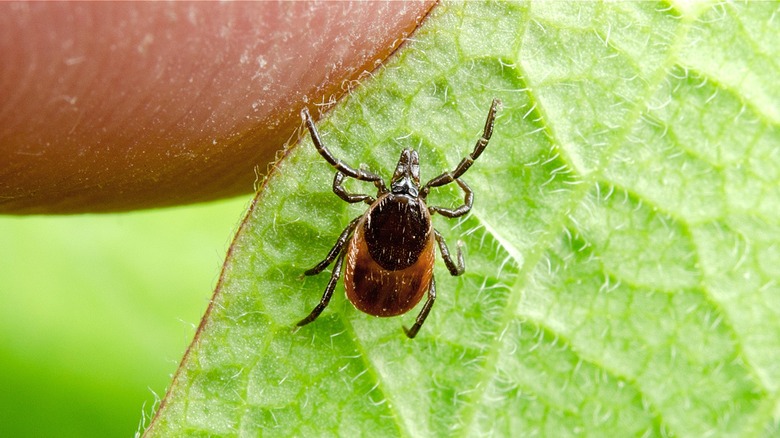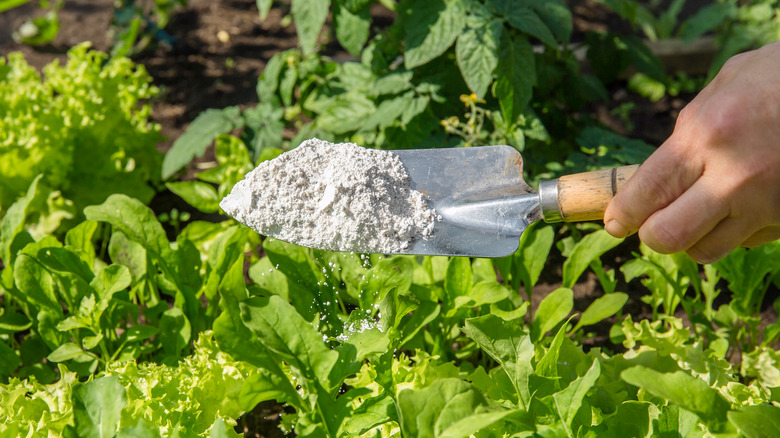Sprinkle This On Your Lawn Soil To Keep Ticks At Bay
Whether you have kids or pets at home (or both), the need for effective tick control cannot be overstated. However, the battle against ticks doesn't stop at the threshold of your home. These arachnids are remarkably adaptable, and they can infiltrate your living space by hitching a ride on your pets, or sometimes even on you. Thus, it's vital to combat ticks both inside and outside your home. But fear not, there's a natural and eco-friendly solution that doesn't involve resorting to harsh chemicals. We're talking about diatomaceous earth (DE), a highly effective method for eliminating ticks on your lawn.
Although these minuscule bloodthirsty arachnids may appear innocuous at first glance, ticks pose a significant threat to your home and health. These tiny creatures can be a big nuisance, both to you and your pets, as they latch onto their hosts to feed on blood. Yet, the real concern lies not only in the irritation they cause but also in the diseases they can transmit. Ticks are notorious vectors for various illnesses, with Lyme disease being one of the most prevalent.
Lyme disease, if left untreated, can lead to serious health complications. Additionally, ticks can transmit Rocky Mountain spotted fever, ehrlichiosis, anaplasmosis, babesiosis, and other harmful pathogens to humans and pets, per the International Journal of Environmental Research and Public Health. DE, though, can prove the silver bullet to your tick control problem, providing you with a non-toxic and sustainable approach to getting rid of these bloodsuckers.
Using diatomaceous earth for lawn de-ticking
Before starting on your tick-elimination journey, make sure you have diatomaceous earth (food or natural grade) on hand, as well as your safety gear; that is, gardening gloves, goggles, and a dust or facemask. To use diatomaceous earth to effectively get rid of ticks on your lawn or in your yard, simply sprinkle a light, even layer in areas where ticks are likely to be, like tall grass, shrubs, and the perimeter of your property. Reapply after rain or heavy dew, as moisture can reduce its effectiveness.
So, what is diatomaceous earth and how does it work to eliminate ticks? DE is a natural substance made from the fossilized remains of diatoms, which are aquatic organisms with silica shells. It comes in a fine powder form and, under a microscope, looks like tiny, sharp-edged particles. When sprinkled on your lawn or around areas where ticks are a problem, DE acts as a desiccant, which essentially means it dries out the ticks. It also works on other pests, including ants, mealybugs, and aphids.
As ticks crawl through the DE, the fine particles cling to their bodies. These particles have microscopic, sharp edges that damage the ticks' exoskeletons or outer shells, causing them to lose moisture. This process eventually dehydrates and kills the ticks. It's important to note that DE is harmless to humans and pets.
Achieve optimum results with a multifaceted approach
While diatomaceous earth may be a fantastic tool for tick control, it is most effective when combined with other preventive measures. To get the best results, keep your lawn tidy by mowing the grass and trimming shrubs regularly to reduce tick-friendly hiding spots. Also, consider installing physical barriers like fences to keep wildlife (which can carry ticks) away from your property. You may also resort to smart landscaping practices by planting tick-repelling plants like lavender and rosemary in your garden.
Further, after spending time outdoors, make it a habit to inspect yourself, your family, and your pets for ticks, as prompt removal can prevent bites and infection with tick-borne diseases. Additionally, use tick-repelling products on your pets and ensure they're tick-free before allowing them indoors. Also note that tick and flea season varies by state; some states like the West Coast states of Washington, Oregon, and California deal with ticks year-round. So, consult a map, like this one from the American Kennel Club, to know when you should be adding DE to your lawn and employing other preventative measures against ticks.


